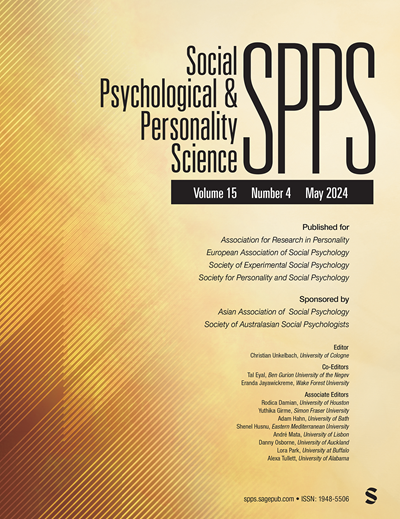Bolstering Policy Support for Disadvantaged Groups Through Humanization
IF 4.3
2区 心理学
Q1 PSYCHOLOGY, SOCIAL
引用次数: 0
Abstract
Cooley et al. and Hodson and Doucher show that individuals, individuals within groups, and groups evoke different levels of perceived humanity, and that these differences affect sympathy and willingness to help. In three preregistered experiments, we successfully replicate these findings in a different cultural context (Slovakia). We then test whether manipulating these depictions also affects support for policies that benefit the target. We focus on a disadvantaged ethnic minority (the Roma). Finally, we investigate whether internal (under the beneficiary’s control) versus external attribution (outside of the beneficiary’s control) is a mitigating factor. We confirm individuals and group-compositions evoke higher levels of policy support than groups through increases in perceived humanity. However, this relationship only holds under conditions of external attribution. To humanize disadvantaged groups and bolster policy support, advocates should center their communicative messages around individuals rather than unitary groups and avoid stereotype-enforcing internal attributions.通过人性化加强对弱势群体的政策支持
Cooley et al.和Hodson and Doucher表明,个体、群体中的个体和群体唤起了不同程度的感知人性,这些差异影响了同情和帮助的意愿。在三个预先注册的实验中,我们成功地在不同的文化背景(斯洛伐克)中复制了这些发现。然后,我们测试操纵这些描述是否也会影响对有利于目标的策略的支持。我们关注弱势的少数民族(罗姆人)。最后,我们调查了内部归因(在受益人控制之下)和外部归因(在受益人控制之外)是否是一个缓解因素。我们证实,个体和群体组成比群体通过感知人性的增加而获得更高水平的政策支持。然而,这种关系仅在外部归因条件下成立。为了使弱势群体人性化,加强政策支持,倡导者应该以个人为中心,而不是以单一群体为中心,避免刻板印象强加于内部归因。
本文章由计算机程序翻译,如有差异,请以英文原文为准。
求助全文
约1分钟内获得全文
求助全文
来源期刊

Social Psychological and Personality Science
PSYCHOLOGY, SOCIAL-
CiteScore
12.50
自引率
1.80%
发文量
77
期刊介绍:
Social Psychological and Personality Science (SPPS) is a distinctive journal in the fields of social and personality psychology that focuses on publishing brief empirical study reports, typically limited to 5000 words. The journal's mission is to disseminate research that significantly contributes to the advancement of social psychological and personality science. It welcomes submissions that introduce new theories, present empirical data, propose innovative methods, or offer a combination of these elements. SPPS also places a high value on replication studies, giving them serious consideration regardless of whether they confirm or challenge the original findings, with a particular emphasis on replications of studies initially published in SPPS. The journal is committed to a rapid review and publication process, ensuring that research can swiftly enter the scientific discourse and become an integral part of ongoing academic conversations.
 求助内容:
求助内容: 应助结果提醒方式:
应助结果提醒方式:


